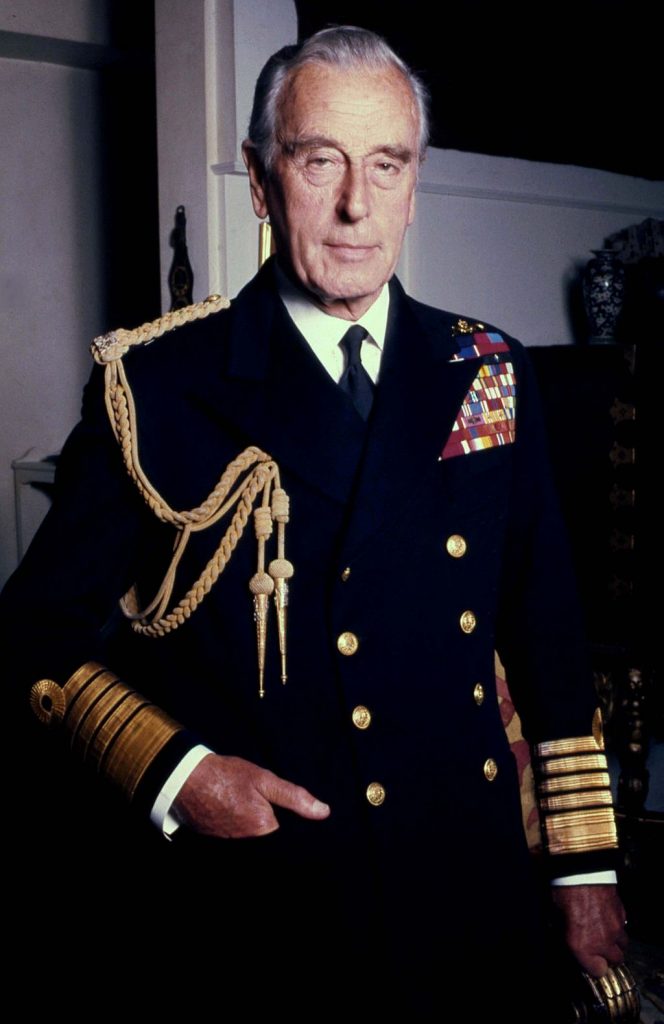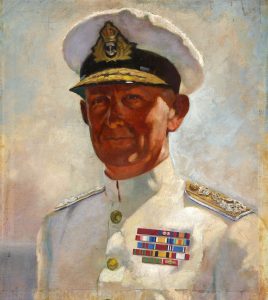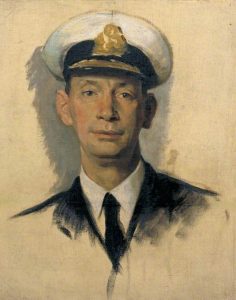
Finest Hour 177
“Pester, Nag, and Bite!”

Lord Mountbatten
December 16, 2017
Finest Hour 177, Summer 2017
Page 36
By Bradley P. Tolppanen
Both in his second stint as First Lord and then as Prime Minister and Minister of Defence, Winston Churchill refused to leave the waging of the war at sea to the admirals alone. Rather he sought to impose his imprint on the navy. With Churchillian energy, he suggested strategy and tactics, argued with his admirals in meetings that dragged into the early morning hours, proposed schemes and operations, rained signals on admirals at sea, and allowed no detail no matter how small to escape his attention. At every turn, he encouraged the offensive and did not hesitate to prod the navy’s flag officers. He badgered those he thought lacking in fire, sacked or sidelined those who had incurred his wrath, respected those who had proven ability even if they disagreed with him, and promoted those he admired. Churchill’s relationship with the senior admirals illustrates the long and difficult, but ultimately victorious, struggle in the war at sea.
Admiral of the Fleet Sir Dudley Pound
“My trusted naval friend.”1
Churchill inherited Pound as First Sea Lord upon taking office as First Lord of the Admiralty in 1939, but quickly grew to like and trust the rather dour old admiral who lacked charisma. He thought Pound, although cautious, had the best brain in the navy.2
Pound’s relationship with Churchill has been controversial, with some condemning him for being weak and failing to stand up to the prime minister, while others praise him for his brilliant handling of Churchill. Pound, who “feared neither God, man, nor Winston Churchill,” never directly confronted his superior over an impractical suggestion with blunt opposition.3 Instead, he would patiently divert the Prime Minister from an impractical scheme by having each proposal thoroughly investigated by the Admiralty’s Plans Division. The detailed analysis would prove the wilder ideas quite impossible and the scheme would usually be abandoned, with Churchill on one occasion asking, “Who thought up this damn fool scheme anyway?”4

2025 International Churchill Conference
Never contradicting the prime minister in a meeting, Pound also chose to resist Churchill only on vitally important matters and allow him his way on lesser issues. Pound, who always considered Churchill a magnificent leader and felt a great loyalty to him, freely gave his expert opinion and mostly prevailed when the two were in disagreement. Most contentiously, Pound has been accused of allowing Churchill a large operational role in the Norwegian campaign and giving in to the decision, made on political grounds, to send the Prince of Wales and Repulse to Singapore, where they were promptly sunk by the Japanese.
Through the first four difficult years of the war, however, Churchill’s energy, on the whole, was effectively directed by the unshakeable presence of Pound at the Admiralty. The First Sea Lord resigned due to ill-health shortly before his death in October 1943.
Admiral of the Fleet Lord Keyes
“The vivid personality and unconquerable and dauntless soul of Nelson himself.”5
A man of action and who was said actually to enjoy war, Keyes was a close friend of Churchill, as they had known each other since before the First World War. In 1918 Keyes masterminded and led the famous raid on Zeebrugge, which Churchill called the “finest feat of arms in the Great War.”6
At the start of the Second World War, Keyes characteristically craved to lead forces in action, despite being sixty-seven years old, a member of parliament, and not having held a command at sea since 1928. He pestered Churchill for an assignment. Not averse to employing older admirals, Churchill eventually used Keyes as a liaison to the King of the Belgians and then in the more important role of Director of Combined Operations with the charge of preparing raids on occupied Europe. Keyes, called one of “Winston’s pets” by a fellow admiral, infused his command with the commando spirit, all the while antagonizing a string of generals, air marshals, and admirals with his charges of timidity.7 With Keyes’ relations with the British chiefs of staff having become poisonous, Churchill was forced to sack him. He did not go quietly, saying that he had received “a very raw deal” from the prime minister.8 After being dismissed in an angry exchange with Churchill, the egomaniacal Keyes begged for another appointment, even suggesting he be made First Lord of the Admiralty.
Admiral of the Fleet Sir Andrew B. Cunningham
“An officer of the old school and the pre-air age.”9

England’s greatest sailor since Nelson had an uneasy relationship with Churchill. Such was his wariness of Cunningham that a reluctant Churchill had to be persuaded to take him as Pound’s replacement as First Sea Lord.
Commander-in-chief of the Mediterranean Fleet at the outset of the war, Cunningham won an outstanding reputation as a brilliant naval commander in the harrowing early years of the war.10 In October 1943, Cunningham was appointed First Sea Lord despite Churchill’s initial opposition. The prime minister had not wanted him, believing him to be ill-suited for detailed staff work and lacking in technological expertise. While it is possible that Churchill believed other candidates were better qualified, it is likely that he did not want such a strong character as Cunningham, with whom he had clashed in the past, in the position. In the Mediterranean, Cunningham had been offended by Churchill’s prodding messages, which he thought were harmful, as they implied a lack of confidence in the commander-in-chief on the spot.11
Cunningham’s relationship as First Sea Lord with Churchill was indeed stormy, and they were often in disagreement, since unlike other officers he was “impervious to Churchill’s spell.”12 Working for the demanding Churchill prompted “ABC” to complain in exasperation in his diary that the prime minister was a “most infuriating man” who kept poking his “nose” into matters that did not concern him. Despite his own reputation for bullying, Cunningham used patience and some skill in working with Churchill, including coordinating a unified front with the other chiefs of staff.
Admiral of the Fleet Sir Bruce Fraser
“An officer of the highest seagoing reputation.”13
As Third Sea Lord, Fraser worked closely with Churchill during the first years of the Second World War. He formed an excellent relationship with him even as he had to contend with the long meetings and seemingly endless stream of memoranda and minutes. Unlike other senior officers who were frustrated by what they saw as Churchill’s interference, Fraser developed an affection for the prime minister.14 Patient and imperturbable with a good humor, Fraser was wellsuited for dealing with Churchill. For his part, Churchill recognized Fraser’s many sound qualities and the admiral soon became one of his favorite officers. Fraser, however, did not hesitate to speak his mind, and they had many loud arguments.
In mid-1942 Fraser became second-in-command of the Home Fleet and the following year took command of the same. With Pound rendered unfit by illness, Churchill sought Fraser as his replacement. Fraser refused to accept the post. He gallantly declined the appointment, telling Churchill that Cunningham was the right man by explaining, “I believe I have the confidence of my own fleet. Cunningham has that of the whole navy.”15
Three months after refusing the senior naval appointment, Fraser won his reputation as a fighting admiral by sinking the German battleship Scharnhorst in the waters off northern Norway. In mid-1944, Fraser was appointed commander of the British Pacific Fleet, somewhat against Churchill’s will since he wanted Admiral James Somerville to continue in the post. In the Pacific, Fraser signed the Japanese instrument of surrender as the British representative aboard the USS Missouri in Tokyo Bay on 2 September 1945.
Admiral of the Fleet Earl Mountbatten
“He is young, enthusiastic, and triphibious.”16
Mountbatten, a famous great-grandson of Queen Victoria, was self-confident, energetic, handsome, intelligent, and charming, but also vain, and an intriguer with fantastic ambition. He was, in addition, Churchill’s protégé.
Mountbatten’s connection with Churchill began when he was a child, as his father, Prince Louis of Battenberg, had been First Sea Lord under Churchill at the Admiralty. Possessing courage and and eagerness for battle, but with perhaps only limited tactical ability, Mountbatten was always in the thick of the action as the commander of a destroyer flotilla in the first years of the war. His exploits caught the “imagination” of Churchill who admired his “up and at ’em, ever optimistic attitude.”17
In 1941 Churchill appointed the audacious, albeit rather reckless, destroyer commander as the Adviser on Combined Operations. This already considerable promotion was further upgraded a few months later when the Prime Minister re-designated Mountbatten’s appointment to be that of Chief of Combined Operations, with membership on the Chiefs of Staff committee. Uniquely, Churchill also promoted Mountbatten to the acting rank of Vice-Admiral, Lieutenant-General, and Air Marshal to reflect his combined role. The Prime Minister “strongly approved” of Mountbatten’s work at Combined Operations, with the Dieppe disaster only briefly jarring his confidence in the naval officer.18
Despairing of the tired leadership waging the British war against Japan, Churchill in 1943, after having won Roosevelt’s approval, announced the appointment of his protégé as the new Supreme Allied Commander in the Southeast Asia Theatre. With his experience in combined operations along with his “great energy and daring,” the Prime Minister declared Mountbatten uniquely qualified for the theatre command.19 Despite sending a new commander to the region, Churchill still considered Burma of secondary importance for the British. Mountbatten, nonetheless, fulfilled Churchill’s expectations by reinvigorating the theatre, winning the campaign in Burma, and taking the local surrender of the Japanese forces at Singapore.
Admiral of the Fleet Sir Philip Vian
“He fought the finest naval action of the war.”20

Churchill always strongly supported aggressive commanders and quickly developed a respect for the hard-charging Vian, a “naturally gifted commander” and one of the war’s great fighting admirals.21 Terribly rude, prone to fits of temper, ruthlessly demanding of his subordinates as well as himself, he was at his best in battle and willing to act on his own initiative. At least one of his fellow admirals said Vian was “not quite normal at times.”22
Churchill held Vian in high regard and “made him something of a mascot” and insisted he appear in nearly every major naval operation “regardless of his suitability for it.”23 During the war, Vian fought against the Germans, Italians, and Japanese, with his finest hour coming at the Second Battle of Sirte when he outfought a much more powerful Italian fleet in an action universally acclaimed as brilliant. In 1943, Vian was summoned back to London from the Mediterranean and invited to Chequers, where he was offered the post of Chief of Combined Operations by Churchill in succession to Mountbatten. Vian, who referred to an earlier desk job he held at the Admiralty as “soul-destroying,” declined the offer. Instead, he received command of the Eastern Task Force for the D-Day landing. Six days after D-Day, Vian escorted Churchill on the off-shore portion of his visit to Normandy. Much against his “better judgement,” he was persuaded by the Prime Minister to take their destroyer inshore and bombard the enemy-held coast.24 Vian ended the war commanding the British Pacific Fleet’s aircraft carrier squadron.
Several war-time naval officers and post-war historians have been critical of Churchill’s involvement in the war at sea and have accused him of dominating the navy’s admirals to poor ends. Recent scholarship has concluded, however, that while a “difficult and demanding master,” Churchill was willing to accept the views of the admirals and refrain from overruling them even when he was not in agreement.25 For his part, Churchill was unrepentant about his relationship with the navy. He made no apologies for having relentlessly sought to “pester, nag, and bite” his admirals.
Bradley P. Tolppanen is author of Churchill in North America, 1929 (2014).
Endnotes
1. Winston S. Churchill, The Second World War, Volume V, Closing the Ring (Boston: Houghton Mifflin, 1951), p. 133.
2. John Colville, The Fringes of Power (New York: Norton, 1985), p. 368.
3. Arthur Marder, Winston Is Back: Churchill at the Admiralty, 1939–40 (London: Longman, 1972), p. 4.
4. Malcom Murfett, The First Sea Lords: From Fisher to Mountbatten (Westport, Connecticut: Praeger, 1995), p. 188.
5. Robert Rhodes James, ed., Winston S. Churchill: His Complete Speeches, vol. VII, 1943–1949 (New York: Chelsea House, 1974), p. 7998.
6. Winston S. Churchill, The World Crisis, vol. III, 1916–1918 (New York: Charles Scribner’s Sons, 1927), p. 87.
7. Michael Simpson, ed., The Somerville Papers: Selections from the Private and Official Correspondence of Admiral of the Fleet Sir James Somerville (Aldershot: Navy Records Society, 1995),
p. 233.
8. Paul Halpern, The Keyes Papers: Selections from the Private and Official Correspondence of Admiral of the Fleet Baron Keyes of Zeebrugge, vol. III, 1939–1945 (London: Navy Records Society, 1981), p. 217.
9. Michael Simpson, The Cunningham Papers: Selections from the Private and Official Correspondence of Admiral of the Fleet Viscount Cunningham of Hyndhope, vol. II, The Triumph of Allied Sea Power, 1942–1946 (Aldershot: Navy Records Society, 2006), p. 147.
10. John Winton, Cunningham (London: John Murray, 1998), pp. 69–205.
11. Stephen Roskill, Churchill and the Admirals (New York: William Morrow, 1978), p. 237.
12. John Colville, Footprints in Time (London: Collins, 1976), p. 188.
13. Churchill, Closing the Ring, p. 163.
14. James Marchant, ed., Winston Spencer Churchill: Servant of Crown and Commonwealth (London: Cassell, 1954), p. 79.
15. Richard Humble, Fraser of North Cape: The Life of Admiral of the Fleet, Lord Fraser, 1887–1981 (London: Routledge & K. Paul, 1983), p. 177.
16. Martin Gilbert, Winston S. Churchill, vol. VII, Road to Victory, 1941–1945 (Boston: Houghton Mifflin, 1986), p. 467.
17. Philip Ziegler, Mountbatten (New York: Alfred A. Knopf, 1985), p. 132
18. Ibid., p. 195.
19. Ibid., p. 222.
20. Winton, p. 394.
21. Adrian Smith, Mountbatten: Apprentice War Lord (London: I. B. Tauris, 2010), p. 296.
22. Martin Stephen, The Fighting Admirals: British Admirals of the Second World War (London: Leo Cooper, 1991), pp. 150–52.
23. Ibid., p. 204.
24. Philip Vian, Action This Day: A War Memoir (London: F. Muller, 1960), p. 147.
25. Christopher Bell, Churchill and Sea Power (Oxford: Oxford University Press, 2013), p. 192.
Subscribe
WANT MORE?
Get the Churchill Bulletin delivered to your inbox once a month.



